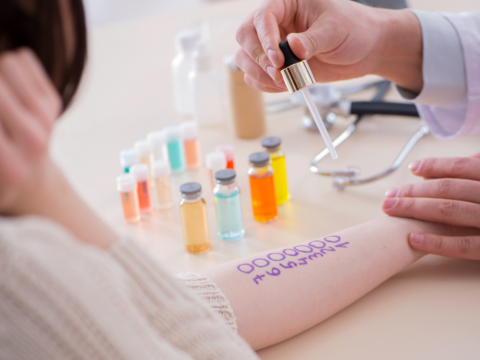Brazos Valley Allergy & Asthma Clinics
The most recommended allergist in College Station and the Brazos Valley.
Common
Conditions Addressed
Our allergy and asthma Clinic has the pleasure of serving hundreds of local doctors in nearly every specialty in providing patients with allergy, asthma, chronic cough, and sinus care. The following are some of the conditions we treat:
In addition to providing the highest level of care for your allergy symptoms, our allergy and asthma specialist are also extensions of your primary care physician.
- Rhinitis (Hay Fever)
- Sinusitis
- Asthma
- Immune System Deficiency
- Urticaria (Hives)
- Atopic Dermatitis (Eczema)
- Contact Dermatitis (Skin Allergy)
- Latex Allergy
- Gastroesophageal Reflux Disease
- Metal or Chemical Allergy
- Eye Allergy
- Food Allergy
- Drug Allergy
- Insect Allergy
- Angioedema (Allergic Swelling)
- Anaphylaxis
- Eosinophilic Esophagitis
Procedures Performed
- Skin Prick Allergy Test
- Intradermal Test
- Patch Test
- Spirometry
- Oral Food Challenge Test
- Immune Deficiency Evaluation
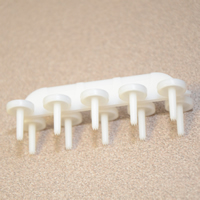
Moreover, an allergy skin prick test identifies those who are allergic to as many as 50 different substances all at once. The test is commonly used to detect allergies to pollen, mold, pet dander, dust mites, and foods. Also, it’s simple, safe, and inexpensive.
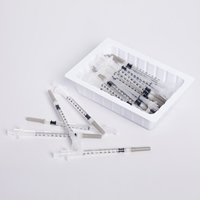
Similarly, intradermal skin testing involves injecting a small amount of allergen into the skin. Afterward, the provider observes the reaction. This test is administered if you are allergic to bee venom or penicillin.
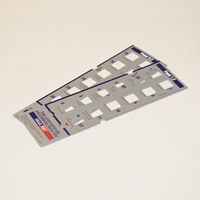
In addition, patch tests are used to identify the underlying cause of allergic contact dermatitis. Patients can also undergo this test in order to determine whether their skin condition is caused or aggravated by a contact allergy. Patch tests differ from skin prick tests, which are used to diagnose hay fever allergy (house dust mites, grass pollens, and cat dander).
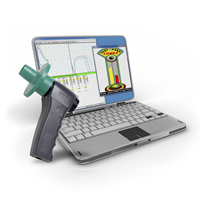
A spirometry test may be used periodically if you already have a chronic lung disorder to check how well your medications are working. Prior to a planned surgery, spirometry may be ordered to make sure your lungs are fit for the procedure. Occupational-related lung disorders can also be evaluated through spirometry.

The sole purpose of a food challenge is also to determine if someone can tolerate a certain food. During the challenge, you will gradually increase your food intake. The test is used by doctors to diagnose or rule out a real food allergy.

On the other hand, the most common manifestations of immunodeficiency are an increased incidence or severity of infectious illness. Initial laboratory testing should be conducted in cases of suspected primary immunodeficiency diseases in a person. This testing involves an HIV test, measuring serum immunoglobulin and complement levels, and obtaining a complete blood count with a differential.
Treatments Performed

There is no cure for allergies, but there are several types of medications -- over-the-counter and prescription -- that can ease and treat irritating symptoms such as congestion and runny nose. Some of these allergy drugs include antihistamines, decongestants, combination drugs, and corticosteroids.
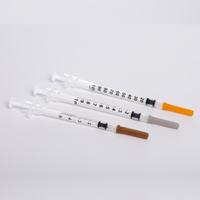
Cost-effective allergy shots are beneficial to allergy sufferers. They don’t also cause severe side effects. Allergy shots are guaranteed to be generally safe.

Immunotherapy or hyposensitization are alternative names for desensitization. The risks of another severe allergic reaction from insect stings can be reduced from 60% to about 5% when you receive immunotherapy.

Sublingual immunotherapy (SLIT) tablet is a self-administered alternative to subcutaneous immunotherapy that offers the benefits of immunotherapy without the inconvenience or expense of frequent office visits or injections. Primary care clinicians may also prescribe the use of SLIT tablets.
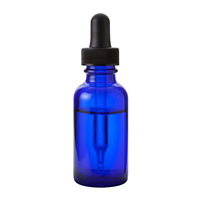
By giving small doses of what a person is allergic to, immunotherapy is able to treat the cause of allergies and reduce allergic symptoms. It is safe for both children and adults. Patients can take the drops in the comfort of their own homes, instead of going to the doctor every week.

TEZSPIRE (tezepelumab-ekko) is a prescription medicine used:
(1) with other asthma medicines for the maintenance treatment of severe asthma in people 12 years of age and older whose asthma is not controlled with their current asthma medicine. TEZSPIRE is not a rescue medication.
(2) with other medicines for the maintenance treatment of chronic rhinosinusitis with nasal polyps (CRSwNP) in people 12 years of age and older whose CRSwNP is not controlled with their current CRSwNP medicine.
DUPIXENT (dupilumab) is an FDA-approved dual inhibitor of IL-4 and IL-13 signaling usually administered every 2 weeks, with 8 different indications (as of January, 2026):
(1) Uncontrolled moderate to severe eczema / atopic dermatitis (ages 6+ months)
(2) Add-on maintenance treatment for uncontrolled moderate-to-severe eosinophilic or oral steroid dependent asthma (ages 6+)
(3) Add-on maintenance treatment for inadequately controlled Chronic Obstructive Pulmonary Disease (COPD) with high blood eosinophils (ages 18+)
(4) Add-on maintenance treatment for uncontrolled chronic rhinosinusitis with nasal polyps (CRSwNP) (ages 12+)
(5) Eosinophilic esophagitis (EoE) (ages 1+ and weighing at least 33 pounds)
(6) Prurigo Nodularis (PN) (Ages 18+)
(7) Chronic Spontaneous Urticaria (CSU) with hives not controlled by H1 antihistamines (ages 12+)
(8) Bullous Pemphigoid (BP) (ages 18+)
NUCALA (mepolizumab) is a targeted biologic treatment approved for the following:
(1) Chronic Obstructive Pulmonary Disease (COPD)—NUCALA is an add-on, prescription maintenance treatment of eosinophilic COPD in adults whose disease is not controlled. NUCALA is not used to treat sudden breathing problems.
(2) Severe Eosinophilic Asthma (SEA)—NUCALA is an add-on, prescription maintenance treatment for patients 6 and older with SEA. NUCALA is not used to treat sudden breathing problems.
(3) Chronic Rhinosinusitis with Nasal Polyps (CRSwNP)—NUCALA is a prescription medicine for add-on maintenance treatment of CRSwNP in adults whose disease is not controlled with nasal corticosteroids.
(4) Eosinophilic Granulomatosis with Polyangiitis (EGPA)—NUCALA is a prescription medicine for the treatment of adults with EGPA.
(5) Hypereosinophilic Syndrome (HES)—NUCALA is a prescription medicine for the treatment of people 12 years of age and older with HES for 6 months or more.
FASENRA (benralizumab) is a prescription medicine (administered every 8 weeks) used:
(1) with other asthma medicines for the maintenance treatment of asthma in people 6 years and older whose asthma is not controlled with their current asthma medicines. FASENRA is not used to treat sudden breathing problems.
(2) to treat people 18 years and older with eosinophilic granulomatosis with polyangiitis (EGPA).
Most biologics are administered every four weeks (with some exceptions as noted) and often can be administered either in the office or at home.
Why
Choose Us?
At Brazos Valley Allergy & Asthma Clinics and Dr. Paul Jantzi, an allergist in College Station, we strive to help our patients be as healthy as possible with respect to their allergies, asthma, and immune system. We achieve this by providing professional services in a personal way while trying to maintain affordability. Our allergy and asthma clinic utilizes both established methods and technological advances to identify and treat many different diseases. Through office visits as well as the use of educational resources, we allow our patients to learn more about their illnesses and take an active and responsible role in their own health care. In addition to providing the highest level of care for your allergy symptoms, our allergy doctors are also extensions of your primary care physician.
Our Allergy and Asthma Clinic is located in the south-central Texas region and provides professional allergy, asthma, and immunology services to clients at numerous locations in the Brazos Valley region.
- Board-certified in Allergy & Immunology
- Custom Tailored Treatments
- Professional, Friendly Staff
- Six (6) Convenient Locations
- Prompt Scheduling Available
- Accepting Most Insurances
- Portal/Electronic Access
- Family Owned and Operated
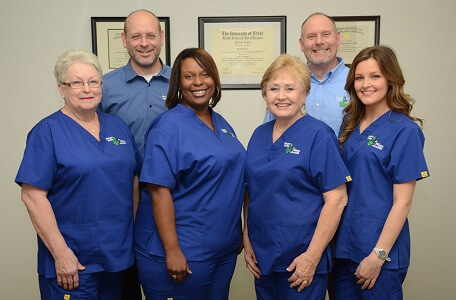
Our Locations
BVAAC - Bastrop
815 Highway 71 W, Suite #1150
Bastrop, TX 78602
Tuesday: 8:00 am - 1:30 pm and
2:30 pm - 5:00 pm
BVAAC - Brenham
2505 Stone Hollow Dr, Suite 100
Brenham, TX 77833
Monday: 7:00 am - 5:30 pm
Tuesday-Friday: 8:00 am - 5:00 pm
BVAAC - College Station
1605 Rock Prairie Road, Suite #218
College Station, TX 77845
Monday: 8:30 am - 12:00 pm and
1:30 pm - 5:00 pm
Wednesday: 9:00 am - 6:00 pm
Friday: 7:00 am - 1:30 pm
BVAAC - Columbus
2540 Highway 71 S., Suite #100
Columbus, TX 78934
Tuesday: 8:30 am - 12:30 pm
BVAAC - Giddings
598 Cactus St,
Giddings, TX 78942
Thursday: 8:00 am - 1:30 pm and
2:30 pm - 5:00 pm
BVAAC - La Grange
1720 N Von Minden Rd,
La Grange, TX 78945
Thursday: 8:00 am - 1:00 pm and
2:00 pm - 5:00 pm











